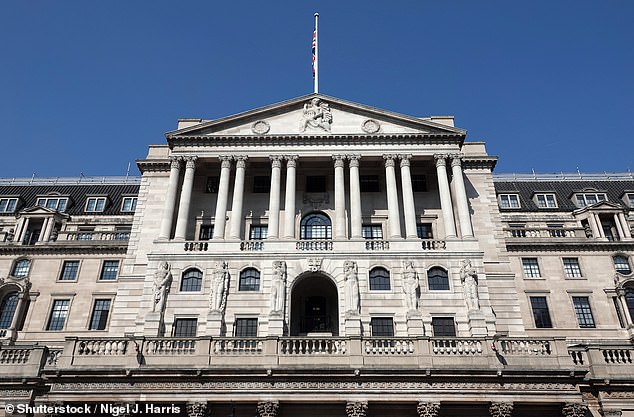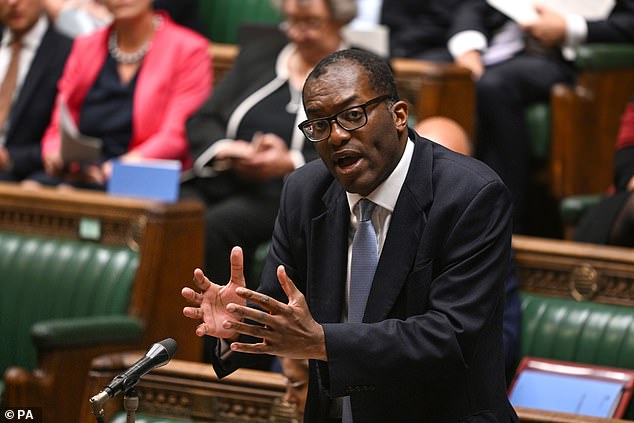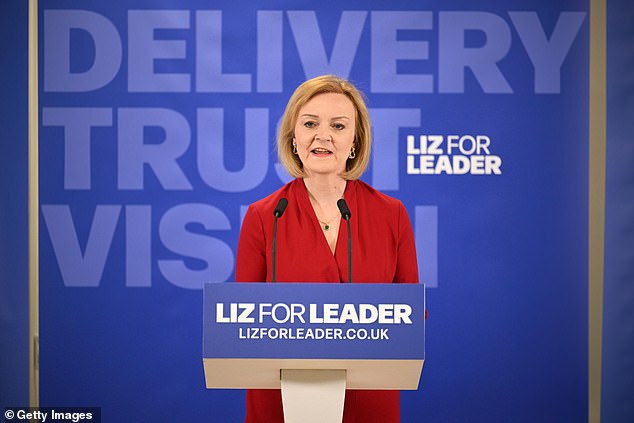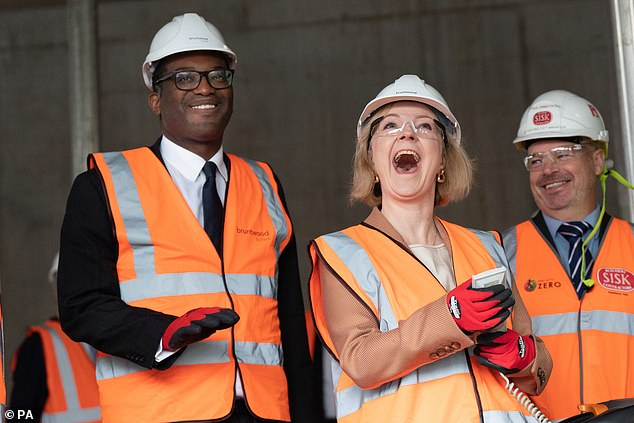Britain was still reeling from the fallout from Chancellor Kwasi Kwarteng’s tax-cutting mini-Budget, presented to the Commons on Friday, September 23, 2022.
Key measures included: a penny off income tax, reversing planned increases in National Insurance and corporation tax, scrapping the cap on bankers’ bonuses, abolishing the 45p rate of tax for high earners, freezing energy bills, relaxing planning regulations and doubling the stamp duty threshold.
Many questioned how Kwarteng was going to fund this bonanza. Markets reacted badly, the pound fell to a 37-year low against the dollar and government borrowing costs soared.
MONDAY SEPTEMBER 26
Markets are in turmoil. The pound again falls against the dollar.
After a calm-ish weekend during which I’d invited my team over to Chevening for a barbecue (Chequers was undergoing refurbishment), I was hit with news of turbulence in the Asian markets.
There’d been no warning about an excessive market reaction from the Treasury – yet they’d known what would be in the mini-Budget.
During the lead-up to the mini-Budget, both the Treasury and Kwasi himself had been talking regularly to Bank of England officials. I’d also laid out the vast majority of our plans in the Conservative leadership campaign.

Prime Minister Liz Truss gives her Leader’s speech to the Conservative party conference, October 5, 2022
So the Bank governor Andrew Bailey’s later claim that they were ‘blindsided’ by our mini-Budget simply didn’t stack up.
As I headed to Downing Street, it became clear more trouble was ahead. The Bank, Kwasi told me, felt they might need to ‘step in’ with an emergency interest-rate rise to restore stability. What few commentators mentioned was that the Bank itself had messed up just before the mini-Budget.
Failing to follow central banks across the world, it had announced an unexpectedly low rise in interest rates.
And now it was being urged to correct what the markets saw as the Bank’s mistake by raising them higher.
Yet, to my dismay, the Bank was laying blame for the current market turbulence entirely at our door. The media, hungry for political drama, eagerly lapped this up.
Meanwhile, there’d been another fall in the pound. This didn’t trigger huge alarm – it hadn’t fallen below what the Treasury had told us to expect.
In any case, the day before the mini-Budget, the pound had already dropped to its weakest level in 37 years.
This was down to the Bank not increasing interest rates enough and, at the same time, announcing a sale of £40 billion in bonds, which pushed up the cost of government borrowing. Yet the fall of the pound was blamed entirely on the mini-Budget.
What I didn’t realise was that things were about to get a whole lot worse.

Ms Truss’s new book Ten Years to Save the West is being serialised in the Mail
TUESDAY SEPTEMBER 27
I wish I’d realised that by unveiling the mini-Budget on a Friday I gave my Conservative opponents a whole weekend to co-ordinate their opposition – briefing the press and stirring up trouble.
Part of the problem we faced was a distinct shortage of expert voices supporting our agenda. Broadcasters and press alike struggled to find economists and commentators who could explain what we were trying to do. This was a sign not only of how unfashionable this true Conservative tax-cutting agenda had become, but of how unfamiliar journalists and MPs themselves were with it.
While I was frustrated by the media lobby’s refusal to engage seriously with our arguments, they were to a large extent reflecting the prevailing culture at Westminster. Ideas and serious policy nowadays take a back seat to gossip, plots and intrigue, and there was no shortage of that during this period.
Taken at face value, our plan was a modest fiscal event, particularly given that it was the precursor to a planned spending review and a firm commitment to get debt falling in the medium term, as promised in my leadership campaign.
So, why was there such an extreme reaction? The obvious answer is that the Treasury establishment and the Bank of England were not on my side.
On a personal note, the Bank governor himself was clearly annoyed that during the leadership election I had questioned the Bank’s mandate and said I would look to review it.
This was painted as an unacceptable attack on an independent institution, as were my criticisms of the Office for Budget Responsibility (OBR) and Treasury orthodoxy.
I knew the economic establishment would resent being challenged, but I had not appreciated just how ruthless they would be in pushing back by all means at their disposal. As uniquely influential figures, their signals to the market took on immense significance.
It was once said that all the governor of the Bank of England had to do was raise an eyebrow to bring errant financial institutions back into line. While that form of informal regulation is widely believed to have been consigned to history, the ‘governor’s eyebrow’ retains the power to shape opinion and move markets.
In our case, it was not just the raising of an eyebrow but a sustained whispering campaign by the economic establishment, encouraged and fuelled by my political opponents in the Conservative Party who refused to accept my mandate to lead. The signal was given that my agenda was a dangerous heresy that could not be allowed to succeed.
It became a question of who had more power over economic and fiscal policy, the elected politicians or the unelected technocrats. As I soon discovered, the answer was worryingly clear: it was them.
But while the resistance of the economic establishment was a crucial factor in our failure to implement the mini-Budget, it did not take place in a vacuum.
Fundamentally, not enough Conservative MPs supported my agenda, and even those who did were not necessarily prepared to do what it took to get the measures through.
From the day of the mini-Budget, those Conservatives focused their ire on the abolition of the 45 per cent top rate of income tax.
I was surprised to find that Conservative MPs should be so resolute in their opposition to a tax cut, of all things, and especially a cut to an anti-success tax that raised little money and had been deliberately introduced by Labour’s Gordon Brown to stoke the politics of envy.
A narrative developed about unfunded tax cuts. This, I’m afraid, shows how much ground the Left has seized – there is hardly ever talk of unfunded spending commitments. (And in any case, our tax cuts were less than the spending increases that have since taken place.)
Kwasi and I probably should have realised how this would be spun by our opponents, but we were spending all our time thinking about reviving the ailing economy. In an ideal world, Kwasi and I would have spent more time providing materials, lining up supporters and making the case that our cuts would promote growth. The plain reality is we had neither the time or resources to do this.
The Bank of England, for its part, was adding fuel to the fire.
It announced that it would ‘not hesitate’ to increase interest rates if necessary. It also deliberately cast us adrift by saying it would make a ‘full assessment’ of the effect of the mini-Budget at its next meeting.
This was lukewarm at best, and it’s unsurprising the markets were unconvinced. They could see Andrew Bailey and the Treasury establishment didn’t believe in our policies – and that threatened to turn a market squall into a full-blown financial crisis.
Sure enough, the response from market analysts was hostile and the pound slipped again.
I was frustrated at the apparent inability of the Treasury and the Bank to provide reassurance to the markets.
They hadn’t forecast the scale of the reaction to the mini-Budget, nor had they taken sufficient action to avert it.
That, in my view, was a failure to do their job.

‘In an ideal world, Kwasi and I would have spent more time providing materials, lining up supporters and making the case that our cuts would promote growth.The plain reality is we had neither the time or resources to do this.’
WEDNESDAY SEPTEMBER 28
Turbulence in the UK bond market pushes pension funds to the brink. The Bank of England announces it will buy £65 billion-worth of bonds to prevent a meltdown, but warns that there’s still ‘a material risk to UK financial stability’. The pound dips again – to $1.04.
What neither Kwasi or I knew was that the UK was sitting on a financial tinderbox. Our pension funds had invested in risky assets called liability-driven investments (LDIs) – and there was now a risk these pension funds would go bust, leading to cataclysmic economic fallout.
Essentially, these pension funds had bet on low-interest rates and they now looked likely to go up. It was a crisis waiting to happen – regardless of the mini-Budget. It was our misfortune to be the ones who entered a room full of petrol while carrying a candle.
I was astonished that no one in the Treasury or the Bank had flagged LDIs up as a problem. In fact, they’d only become aware of it when contacted by nervous pension fund managers on Friday afternoon.
The over-reliance on these dodgy products was due partly to poor regulation and oversight by the Bank and financial authorities and a lack of awareness by the Treasury.
One of the reasons we failed to communicate all this to the media is we didn’t fully understand what was happening ourselves. I hadn’t heard of LDIs and neither had most Treasury officials.
We certainly didn’t realise it was going to turn into a major issue.
So we struggled both to understand and to explain what was happening. And, in a 24-hour news cycle, that’s fatal.
At least the Bank’s decision today to spend up to £65 billion to buy up bonds managed to avert a financial meltdown. But it set a time limit for doing this of 13 days. This was profoundly unhelpful, effectively creating a cliff edge.

‘I was astonished that no one in the Treasury or the Bank had flagged LDIs up as a problem. In fact, they’d only become aware of it when contacted by nervous pension fund managers on Friday afternoon.’

Chancellor of the Exchequer Kwasi Kwarteng delivering his mini-budget in the House of Commons, London, September 23, 2022
THURSDAY SEPTEMBER 29
Truss does a bruising round of local BBC interviews, defending the mini-Budget. A poll gives Labour a 33-point lead over Tories – the biggest gap since the 1990s. Estate agents say house sales are collapsing as 2,000-plus mortgage deals are withdrawn because of economic uncertainty.
FRIDAY SEPTEMBER 30
Backbenchers warn Truss she risks a Commons rebellion on slashing taxes for the highest earners.
‘Your ratings are worse than Mrs Thatcher’s at her most unpopular – but don’t worry, we can turn this round.’ The cheery tones of Conservative party chairman Jake Berry hit me as I sat in the car on the way to a business visit ahead of the Conservative party conference in Birmingham. I’d been avoiding the media for days, and now my bubble had been well and truly burst.
From our opponents, we were facing a full-blown feeding frenzy, with a precarious international market, a restive media, agitating politicians and the establishment all egging each other on.
Kwasi and I simply weren’t ready for this level of onslaught. For one thing, we didn’t have enough supporters willing to defend our position.
For another, our political infrastructure was weak and very newly established. Plus a significant number of Conservative MPs were still unhappy I’d become leader, and weren’t willing to give me a chance.
They were objecting to the removal of environmental red tape, which would allow us to get on with fracking and build more houses. They objected to the focus on the economy at the expense of subjects like net zero.
They objected to the speed of our changes. They didn’t seem to understand that the UK was heading towards an economic cliff – and that I was trying to perform a handbrake turn to avoid driving it off the edge.

‘Kwasi and I simply weren’t ready for this level of onslaught. For one thing, we didn’t have enough supporters willing to defend our position.’
SUNDAY OCTOBER 2
Start of the annual Conservative party conference. Michael Gove calls on Truss to reverse scrapping the 45p rate of tax (for those earning more than £150,000) and refuses to vote for the mini-Budget as it stands. Truss admits ministers could have done more to prepare the ground for it.
I knew the party conference would be difficult. I needed to keep the Cabinet on board, deal with restive MPs and not show any chinks in the armour. I could certainly forget about enjoying the political honeymoon most Prime Ministers are given on taking office.
The parliamentary party was deeply divided and had acquired the habits of rebellion and regicide against its leaders. In the space of three years, Theresa May and then Boris Johnson had been brought down by their own MPs, making the position of Conservative Party leader more precarious than it had previously appeared.
MPs who had remained loyal resented those who had ousted them and vice versa. We had then been through a bruising leadership contest that further fractured party unity and poisoned personal relationships – and in which more than half the parliamentary party had supported my opponents.
Many of them actively wanted to bring me down and, having seen the fate of my predecessors, had high hopes of doing so.
Could I have done more to win them over? I’m gregarious and I like people, but even my best friends wouldn’t describe me as a great people manager.
Perhaps I also haven’t spent enough time during my career listening to and empathising with my parliamentary colleagues.
And I probably haven’t done a very good job of hiding what I think about some of them either!
By the time I got to the conference, rebel MPs were pouring kerosene on the market jitters and my poor opinion poll ratings. They had also fomented a revolt about the 45p tax rate.
I wasn’t all that surprised Michael Gove was leading it, because I knew he had anti-growth instincts.
In Manchester, I was stuck in my suite on the top floor of the hotel, with people constantly coming and going, while having to endure the familiar strains of protesters with loudspeakers outside. It was like a mini-Downing Street.
I was occasionally let out for a walk. Otherwise, I was isolated up there with my practice podium for rehearsing my big speech and an endless supply of American pancakes and maple syrup. At least the conference was one of the few occasions when my daughters Frances and Liberty were able to join us. They were smuggled in under the guise of being Welsh Young Conservatives.
Little did the lobby journalists getting into the lifts with Rosie and Molly from Cardiff North know they were my daughters incognito. Suffice to say, they had more fun than I did.
Up in my suite, I received a number of delegations of colleagues pressing for various policies to be reversed, in particular the abolition of the 45p tax rate.
It steadily became evident that even my own supporters weren’t prepared to back it.
I concluded that, rather than let the conference be dominated by the issue, it would be better to lance the boil and back down.
I met Kwasi and various advisers in my room. We agreed we needed to take the hit now on the 45p so we could move on. If we didn’t, the whole conference would descend into open warfare.
Then we announced the climbdown and Kwasi went off to rewrite his speech for tomorrow.
Backing down on the 45p eased some of the pressure, but my critics moved on to complaining about our plans to stop the welfare bill from rising so fast.
I was determined, however, to stick with that.
Our plan to restrict the growth in benefits – to match the average rise in wages rather than inflation – was both politically popular and economically beneficial.
It seemed to me wrong that somebody on welfare would get a bigger rise than someone in work.I couldn’t for the life of me understand why Conservatives were opposing it.

Prime Minister Liz Truss and Chancellor of the Exchequer Kwasi Kwarteng (left) during a visit to a construction site for a medical innovation campus in Birmingham, October 20, 2022
WEDNESDAY OCTOBER 5
In her speech to the Tory conference, Truss admits her plans will cause disruption but says there’s no alternative if Britain wants to prosper. Her speech is interrupted by Greenpeace campaigners. A new poll gives her an approval rating of minus 59 – lower than the worst recorded for Boris Johnson or Jeremy Corbyn.
Today, I made my keynote speech, renewing my commitment to focus unrelentingly on economic growth and attacking the vested interests of what I called ‘the anti-growth coalition’.
Somewhat helpfully, some of that coalition decided to show up in person, as I was interrupted by environmental protesters.
This helped rally the audience behind me, with loud cheers as they were led away.
After a difficult ten days, it was satisfying to set out my stall as Prime Minister. By the end of the day, I felt cautiously optimistic that we might have weathered the worst of the storm.
Adapted from Ten Years To Save The West by Liz Truss (Biteback, £20). © Liz Truss 2024. To order a copy for £17 (offer valid to 27/04/24; UK P&P free on orders over £25), go to mailshop.co.uk/books or call 020 3176 2937.















